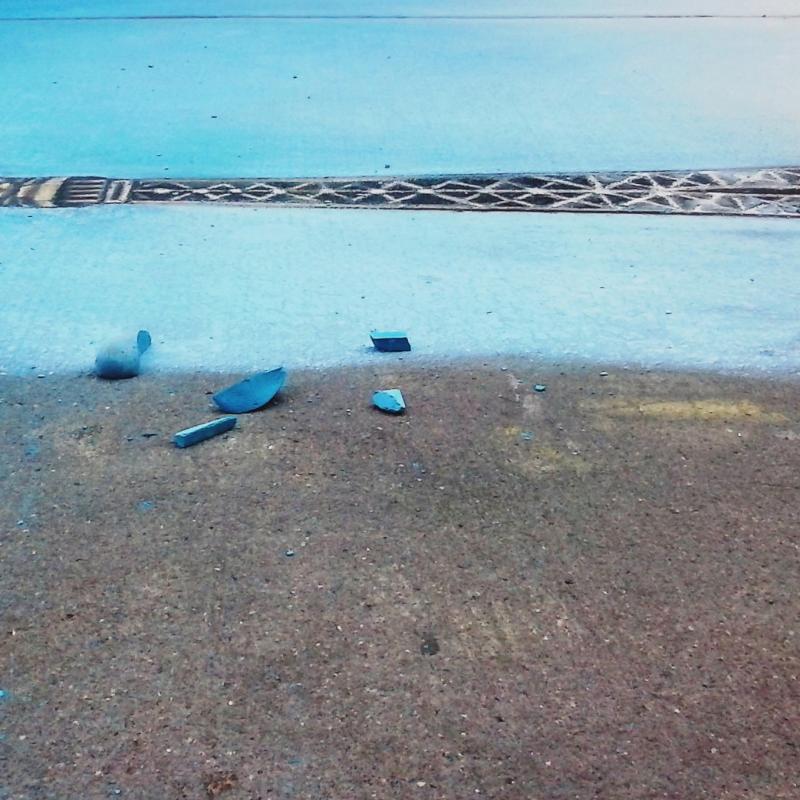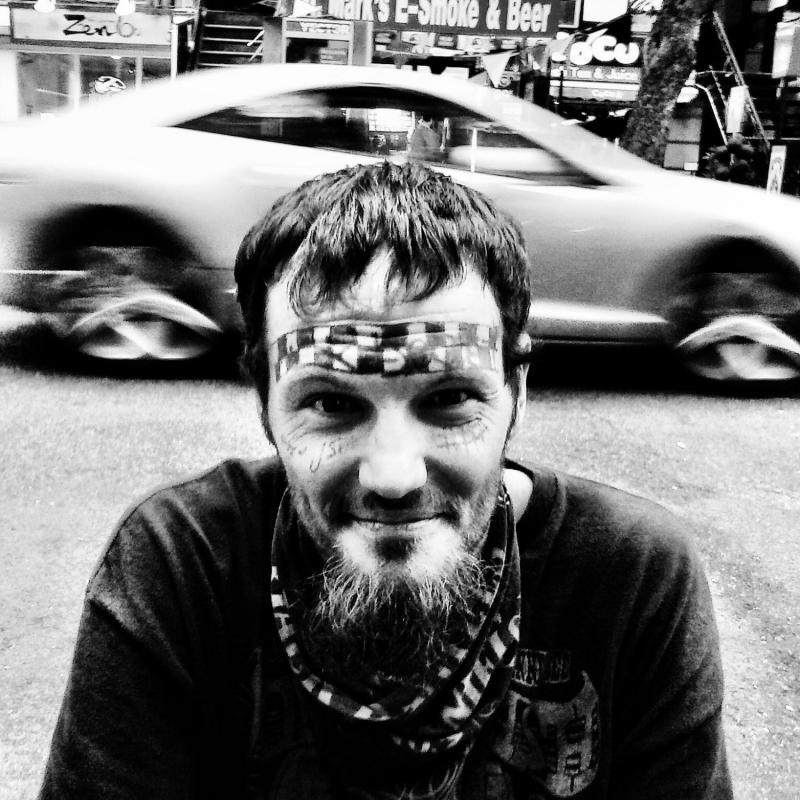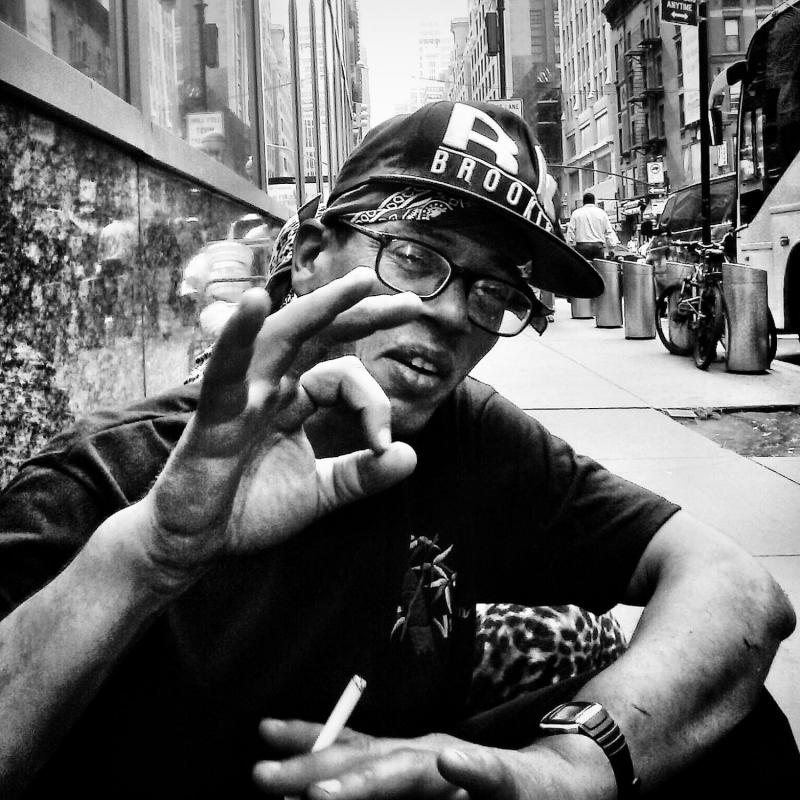1.
Joseph Ritter used to be a fighter. Says he knocked out Bam Bam Bogner in ’87. Second round. “I caught him real quick with a three-piece combination—bing-bing-bing.” Says a boxing magazine once called him up-and-coming. He grins: “And smokin’.” No drugs or booze, he says. Just coffee and cigarettes. “I smoke like a Chevy with a bad oil leak.”
Says he fought in Iraq, too. Fallujah, early ’90s. His convoy rolled into a village. “There weren’t supposed to be any combatants.” But there were. An RPG destroyed the lead Hummer. “The guys inside were gone, it lit up like a torch.” He ran to help a buddy who was hit, drag him the hell out of there. That’s when the AK-47 blew his hip apart. Three shots. “All I felt was burning, like I was on fire. Next thing I knew I was in a helicopter.”
Joseph wants to work. He worked as a plumber in Philly. “War’s easier than being homeless,” he says. He was offered a plumbing job—no money for boots. A job waiting tables—no money for shirts. “No this, no that, no, no, no, no, no. No job, no phone, no money, no clothes, no way to clean up. All those nos piled up make things really difficult. The one thing I do have is need.” I start to feel like he’s trying to sell me something. Before I sat down, I’d offered him ten bucks. “I was hoping for twenty,” he’d said.
I ask how he ended up out here. Says his ex-wife got a DWI with their kids in the car. Child Services took the kids; he came up from Philly; the judge threatened him with abandonment charges; the money for hotel rooms ran out; here he is. Something doesn’t add up. Maybe. I ask to see the scars. The ones from that AK-47. “That’s a little personal, bro. They’re near my groin, right above my gun.” Later I’ll look up Bogner: Bang Bang, not Bam Bam. No record of a bout with a guy named Ritter.
“I love to do it,” he says. He means fighting. “In 130 seconds, I’ll hit a guy sixty times. My hands are like a machine gun.” He opens and closes his fists. Five, six times. Fast—really fast. Knuckles pop like firecrackers, dozens of them. He smiles. “Everybody calls me Champ.”
2.
On the corner of 14th Street and Union Square West, Hani Shihada is chalk-drawing a portrait of the Eiffel Tower surrounded by blue sky. He’s been making sidewalk art in the US since 1979. “There are many angry people out here,” he says. “On the sidewalk, anything can happen.”
Once, in front of New York Public Library, a cop told him to stop asking for money—or else move on. Hani removed his donation bucket. “You have to leave anyway,” the cop said. Stay, and I’ll arrest you. “I’ll take my chances with a judge,” Hani said. A few old women, “grandmas,” started yelling, standing up for him. “They usually look out for me,” he says. This time, they made it worse. The cop called for backup. “The more the old ladies yelled, the angrier he got.”
A man wearing a cowboy hat that looks a bit like a sombrero approaches, asks Hani for one of his “colors”—a piece of chalk. “My mother and I went to Paris together once,” the man says, “and she died. It would mean a lot.” Which piece, Hani wants to know. “One of the blue ones.” This one? No. This one? No, no. “That one,” the man points, “the smallest one, there.” Hani hands it to him. “Where are you from?” the man asks. “I’m Palestinian,” says Hani. The man smiles, nods: “Well, I’m from Texas.”
I ask about those cops. Hani says they cuffed him, took his colors, destroyed them. Inside the cruiser, one cop tightened his cuffs some more. “I said ‘Please, please, they hurt.’ I was new in this country. I was scared, I was crying.” They’re gonna love you in jail, another cop said. “They were making fun of me.” It was a Friday. Hani didn’t see a judge till Monday. Three days in the slammer for chalk and loose change.
In jail, they cuffed Hani to a bench. He laughs. A soft, tired laugh. “I’m already behind bars, I have to sleep with cuffs on? Chained to a bench?”
There are many angry people out here. On the sidewalk, anything can happen.
3.
Gregg Simons is thirty-one, calm, articulate, friendly. He says the tattoo on his right cheek reads “Suck A Dick” in Arabic. It’s his favorite thing to say, “when someone’s being an asshole.” The one running across his forehead used to read FUCK SOCIETY. Now, it’s checkered.
Gregg says he stole a car when he was fifteen. He and a buddy led cops on a high-speed chase. Cocoa Beach to Orlando. “It was all over the news,” he says. Like O. J.? Like O. J. “I was famous for two months.” The cops spike-stripped the car, blasted them with Mace, “swarmed us, cuffed us, kicked us around.” Then they found the cocaine. Lots of it. He did three and a half years in juvie. “I got lucky,” he says about the time.
His girl introduced him to freight-hopping. He’s been jumping trains for four years. She’s in Springfield, Massachusetts, holding down their room till he gets back. He blinks a few times. “Man, I found the one chick everybody talks about finding. With her, I’m happy.”
No more heroin for Gregg. “I stick to weed now.” Yeah? “Yeah. It’s a lot better than nodding out on the sidewalk, trying to suck my own dick, drooling all over myself.” He’s been arrested in Nashville, New Orleans, elsewhere. “That’s her only rule: call once a month.” He means his mother. She’s happy whenever he calls from jail. “At least she knows I’m safe, I’ll be there for a while.”
I ask if he’ll ever go straight, settle down. “Shit, I’ll make more money asking people for a quarter than I will working a regular job.” I know he’s right.
I want to say something. That I stole a car when I was sixteen. That I used to shoot dope, live on the street, make a hundred bucks a day begging for change, keep my mother wondering when she was going to get that other kind of call. That I turned it around, started writing about it—the life, how hard it is to give up—that he can, too, that he should, that forty-one ain’t thirty-one, that—further.
I want to say something, but I don’t. It’s not my place. It’s not my time. They’re not my checkers.
4.
“I know you,” he says. “I know you, man. I know you.” I’ve yet to sit down. I assure him we’ve never met. “Naw, man, naw. I know you, man—I KNOW you.” I tell him again we’ve never met. “Naw, man.” He shakes his head. “I know you. You arrested me.” I assure him I’ve never arrested him, never arrested anyone. “Naw, naw, naw, you A-RRESTED me.” He cocks his head, narrows his eyes. “Which precinct you work at again?”
We’re on West 40th Street, just around the corner from that statue of Jackie Gleason, the one of him as Ralph Kramden in The Honeymooners. The guy points at my cigarette, wiggles his finger. I sit down, hand him one, light it. It’s 9:45 A.M. “Man, I KNOW you’re a cop.” I ask for his first name. He leans back, wincing. Then a light goes on. “Biggie Smalls,” he says, grinning. “Yeah, yeah, Biggie Smalls, Biggie Smalls.”
He wants money. I want a story. A low-stakes showdown. “Aiight, aiight,” he says. “I know how this works, I know how this works. You want some crazy shit? You want some crazy shit? Yeah, yeah, I’ll give you some crazy shit. I got crack stories, bust stories—” I shake my head, say that’s not how it works, you’ve gotta be honest. He looks away, takes a drag, blows smoke, looks back at me. “I know you, man—I KNOW you.” I get up to leave. “Wait, wait!” he says, thinking, taking another drag, blowing more smoke. Then: “I’m telling you, man, I know you.” I start to walk away. He flicks his cigarette. It flies past my kneecaps, sails over the sidewalk between a few pedestrians, nearly grazes a hot dog vendor’s ankle before dropping into a puddle on the other side of the curb and—tsst—fizzling out in the murky water. A perfect shot. “I know you,” he says again, swiping the air with his finger. “We got high together.” I turn, face him, shrug. “Make up your fucking mind, man. Am I a cop or did we get high together?”
This essay is part of our #VQRTrueStory project, a social-media experiment in nonfiction that delivers stories across platforms. Each week, a contributor takes over our Instagram feed, @vqreview, to post original dispatches that tell the stories behind the pictures. The dispatches are then published on our website, and two are selected for inclusion in each issue of the magazine. You can visit the #VQRTrueStory archive to read all the contributions so far. And be sure to follow @vqreview to keep up with the project as it unfolds.











